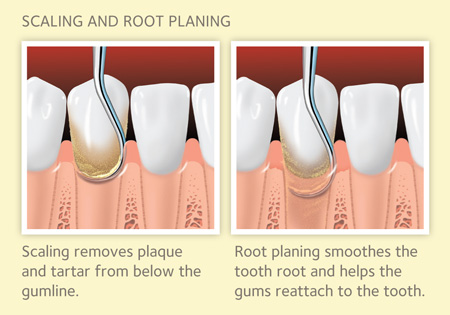What is Deep Scaling/Root Planing?
Deep scaling is a periodontal procedure performed to remove the dental plaque from the root of the teeth and also from the area below the gumline. Then the exposed surfaces of the tooth’s root undergo smoothening or planning to remove the dentine and this procedure is called Root Planing. Both these dental procedures are collectively known as Deep Cleaning.
The dental plaque residing in the tooth’s root and below the gumline have bacteria that can cause infections, while the dentine residing at the tooth’s roots will have calculus, toxins or microbes. These can cause periodontal diseases, causing damage to the gums, which in turn affects the root and the bone connecting the tooth to the jawbone. This will lead to the instability to the tooth.

Deep Cleaning Vs. Regular Cleaning
Regular Cleaning, also called Prophylaxis cleans the area that is visible to the naked eye by removing the plaque or tartar that is present on the tooth’s surface.
Deep cleaning, on the other hand, will remove the bacteria, tartar, dentine and the debris that is present in the area below the gumline also.
Deep Cleaning
This is usually performed on patients who have excess buildup of plaque, which in turn might cause gum diseases like Periodontitis. Periodontitis is one of the major causes for tooth loss. The bacteria that cause Periodontitis can enter the bloodstream through the infected gum tissue and in turn affect the heart, the lungs and other organs of the patient’s body. In some cases, Periodontitis has indirectly been the cause for diseases like coronary artery diseases and respiratory diseases, rheumatoid arthritis etc.
Periodontitis is common but can be prevented. It is mainly due to poor oral hygiene. Brushing twice a day, flossing daily and regular dental visits keeps periodontitis at bay and prevents it from developing further.
Some of the symptoms of Periodontitis are:
- Swollen gums
- Receding gums
- Gums that bleed
- Change in the color of gums
- Bad odor
- New gaps developing between the teeth
- Tender gums
The dentist usually diagnose the need for deep cleaning that includes Deep Scaling and Root Planing by making some measurements of the pockets that develop when the gum tissue loosens. This measurement is called Periodontal Charting or Pocket Measurements. If the pocket measure is above 4mm, then the dentist will recommend Deep Cleaning.
Deep Cleaning Procedure
The dentist might recommend one or two appointments to complete the whole procedure, as it is different from regular cleaning, which can be done in a single sitting.
The dentist will first numb the area where deep cleaning needs to be performed, by administering anaesthesia. Then the dentist will clean the debris collected below the gum line. Further he may shape or plane the root to prevent any further collection of debris and bacteria.
Post Deep Cleaning Procedure
- The dentist will prescribe an antibiotic regimen to be followed for recovery from this procedure. He might prescribe a pain reliever to cope up with the soreness and pain that might set in.
- The dentist will also recommend an oral hygiene plan of regular brushing and flossing that will help to take care and maintain your teeth and gums.
- The dentist will also recommend periodic visits to ensure that there is no buildup of debris, plaque and tartar.
Authored By Dr Sanjay N - Orthodontics & Dentofacial Orthopaedics, Bangalore









